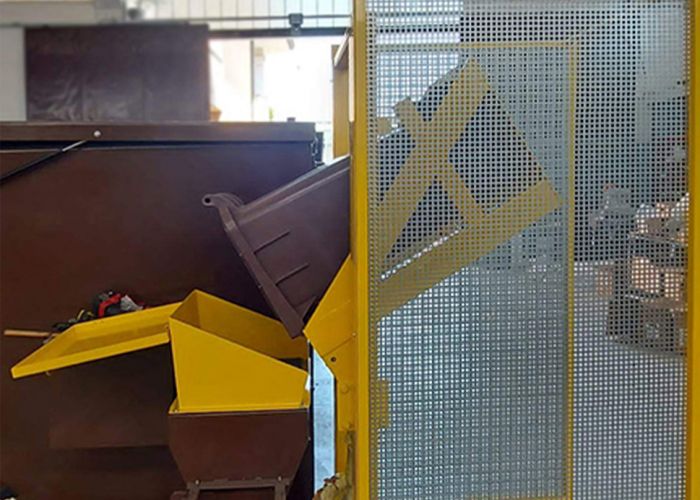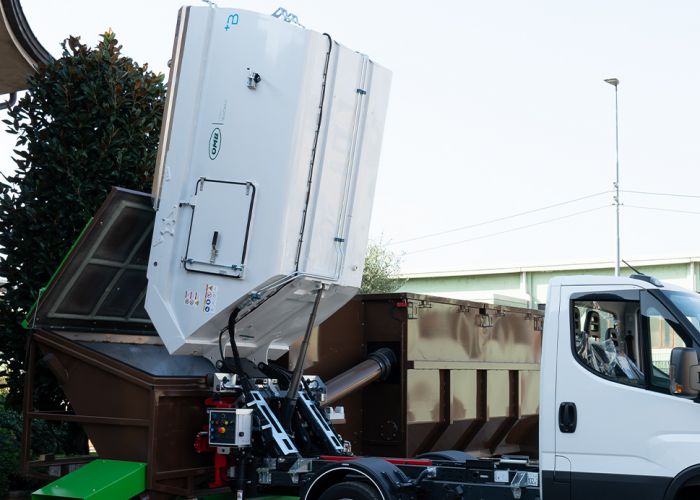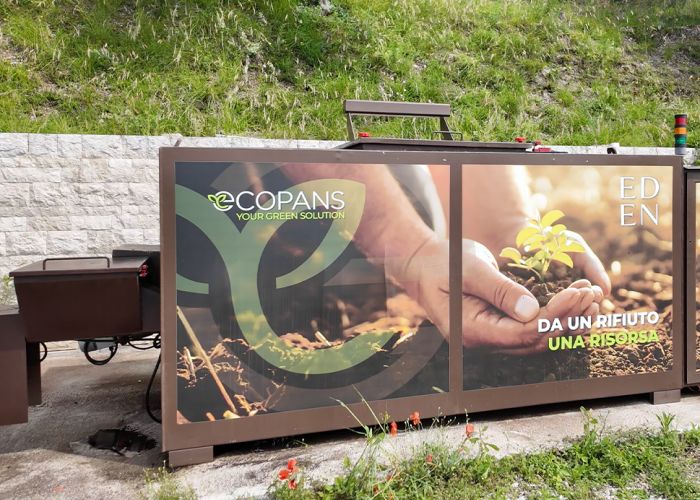TURN YOUR WASTE INTO RESOURCES: THE ECOPANS COMPOST BIN FOR YOUR TOURIST FACILITY
Do you own a tourist facility and are looking for a solution for managing organic waste and pruning clippings from your green areas?
The Ecopans electromechanical composter is the ideal solution for managing your organic waste. Not only that, from what you considered waste you can get a resource: top quality compost to use in the green areas of your facility to make it even more lush!
Technology
for environment
THE ADVANTAGES FOR TOURIST FACILITIES
TECHNICAL ADVANTAGES
![]()
The machines can process both organic waste from kitchens and restaurants and appropriately shredded waste from green maintenance.

Possibility of delivering organic waste at any time without depending on the collection system and without generating odors.
![]()
Weather resistance, no need for a canopy, shed or box.
![]()
Does not require permits because it is self-composting.
ECONOMICS AND
ENVIRONMENTAL BENEFITS
![]()
Reduced organic management costs
![]()
Excellent quality compost for your facility's green areas; self-produced compost will be free of impurities because it comes from more careful collection.
![]()
Circular economy: on-site waste management and km0 compost.
![]()
Environmental sustainability: reduction of CO2 emissions related to waste collection, transport and disposal at centers located a long distance from the place of production.
STATE INCENTIVES (Italy only)
The incentives can be combined.
Industry 4.0 Facilitation
Thanks to remote control for monitoring the composter, Ecopans composting machines allow customers to benefit from the National Industry 4.0 Plan, with a 20% tax credit.
Single SEZ facilitation
Companies in Southern Italy (Abruzzo, Basilicata, Calabria, Campania, Molise, Puglia, Sicily, Sardinia) can obtain a contribution of up to 70% in the form of a tax credit.
New Sabatini Law
Enables benefits on financing and leasing for machinery and equipment.
THE FACILITIES
The installation of a composter is recommended in all facilities that need to manage organic waste from their kitchens and mowing from green maintenance, in particular, in those that operate in hospitality and service-related sectors, where this waste must be managed as quickly as possible and without generating odors.
Listed below are the types of facilities where it is particularly advantageous to install a composter:
|
Hotels, Resorts, Mountain Huts, Restaurants, and Event Facilities (banquets for parties and weddings): Large tourism facilities, which cater to guests at their facilities and often also provide major banquets and catering, generate a considerable amount of food waste. Installing a compost bin allows for better management of organic waste from cooking and canteens, thus reducing the amount of waste going to landfill and contributing to more sustainable management. |
|
|
Agritourisms and Masserias with in-house agricultural production: Facilities that offer more personalized stays, often in rural settings, can benefit from composting both organic waste produced in the kitchen and plant residues from gardens or vegetable gardens. Agritourisms, in particular, can use compost to fertilize their crops, closing the waste cycle in an environmentally friendly way and giving value to their organic produce. |
|
|
Camping, Glamping and Holiday Resorts: Facilities that host large numbers of tourists, in bungalows, tents or RVs, can generate organic waste in large quantities. Installing compost bins in common areas or central kitchens can help reduce the volume of waste and improve the sustainability of the facility. The compost will be most useful in enriching guest service areas. |
|
|
Hostels and vacation rentals: These facilities, which frequently host groups of people, can benefit from a composting system to manage food waste generated by shared kitchens. In addition, the adoption of eco-friendly practices such as composting can be a distinctive feature that attracts sustainability-conscious tourists. |
|
|
Wellness centers and spas: Even in facilities that offer wellness and relaxation services, such as spas and spas, installing a compost bin can prove beneficial. These centers often produce vegetable waste (for example, in the preparation of extracts or fruit and vegetable dishes), which can be easily composted. |
A tourism facility that decides to install an electromechanical composter demonstrates a concrete commitment to the environment, contributing significantly to the reduction of organic waste and promoting environmentally friendly practices. The adoption of a composter not only allows for efficient management of food waste, turning it into compost useful for fertilizing gardens and green areas, but also represents a fundamental step toward responsible management of natural resources.
The Ecopans composter is the right solution to optimize material recycling and reduce dependence on external resources.
As for the tourism sector, installing an on-site composting system can be a distinctive element in the facility's sustainability strategy. This action allows the facility to meet several green criteria required by certifications such as Green Key, Ecolabel, and the Tripadvisor Green Leader program. Earning these awards not only optimizes the rating of the business, but also attracts an increasingly environmentally conscious clientele.
Green Key:
This international certification rewards facilities that adopt environmentally sustainable practices. Waste management, use of renewable energy, and reduction of environmental impact are just some of the parameters evaluated. The compost bin is an element that demonstrates a concrete commitment to eco-sustainability and facilitates the acquisition of this recognition.
Ecolabel:
This European eco-label certifies tourism products and services that meet high environmental standards. Installing a compost bin helps meet waste management criteria and reduce overall environmental impact, making it easier to qualify for this certification.
Tripadvisor Green Leader:
The program rewards tourist facilities that adopt environmentally friendly practices. The use of a composter is a tangible sign of commitment to sustainability, which can earn points in this rating.
IN SUMMARY:
ECOLOGICAL CERTIFICATIONS
In summary, the installation of a compost bin not only helps to reduce the environmental impact of the facility, but also represents an important step toward obtaining ecological certifications that increase the competitiveness and appeal of the tourism facility, meeting the growing demand for responsible tourism.
REDUCING THE ECOLOGICAL FOOTPRINT
The adoption of a composter is beneficial in any tourist, commercial or recreational facility that wants to reduce its ecological footprint, improve waste management and promote sustainable practices. In addition, the composter is a resource for the creation of educational concepts related to sustainability and can also facilitate the achievement of environmental certifications, improving the image and appeal of the facility itself.

 />
/>
 />
/>
 />
/>
 />
/>
 />
/>
